MRRL Hall of Fame
QUESTS
- Details
- Category: Inductees
- Created: Monday, 02 March 2020 09:23
- Written by Gary Johnson
Launched in the wake of the British Invasion and the explosion of teen clubs all over the state, The Quests emerged from Grand Rapids, recording three high quality singles on Dave Kalmbach’s Fenton label. Inspired by both The Beach Boys and The Beatles, The Quests’ vocal harmonies and driving beat made them one of Southwest Michigan’s most popular bands from 1966 to 1968.
Lead singer and group spokesman Bob Fritzen was born in Grand Rapids in 1946. Growing up in a modest home, there wasn’t a lot of money to buy records; but his parents enjoyed listening to country music on the radio, and he became a fan of Jim Reeves and Patsy Cline while growing up. His father had played guitar and sang in a band before being seriously wounded during WW II. He still kept his guitar, but Fritzen didn’t become interested in playing one until later in high school.
Fritzen was an athlete at Grand Rapids West Catholic who had earned a scholarship to the University of Idaho for baseball and football. Unfortunately, he suffered a serious leg injury during his senior year that required multiple surgeries and put an end to that dream. 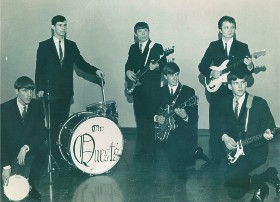 The Quests (Standing L to R) Neil Turmell, Bob Dengate, Bob Fritzen (Kneeling L to R) Jim Nixon, Joey Suchocki, Lyle Hotchkiss
The Quests (Standing L to R) Neil Turmell, Bob Dengate, Bob Fritzen (Kneeling L to R) Jim Nixon, Joey Suchocki, Lyle Hotchkiss
No longer able to play sports at a high level, his interest shifted to music. Fritzen became a big Beach Boys fan, especially Brian Wilson’s falsetto vocals. A breakthrough event occurred when he made a recording of Beach Boys’ songs, “In My Room, “Catch A Wave”, and “Farmer’s Daughter”, with a group of high school friends on a small reel-to-reel tape recorder purchased by his parents. The recordings took place at the home of future Quests’ bassist, Bob Dengate. This was an eye-opening experience for Fritzen, as he discovered that he had the ability to sing falsetto and emulate the sound of Brian Wilson.
Fritzen started playing guitar in earnest during his senior year at West Catholic. He had been taking lessons on steel guitar but soon switched to the six-string guitar. Asked by his instructor if he could sing, Fritzen began playing in the instructor’s country band. It gave him some valuable experience, both playing on the radio and at large gigs including the Ionia Free Fair and the Lowell Showboat. 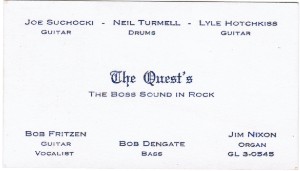
After enrolling at Grand Rapids Junior College in the fall, Fritzen began jamming with high school friend Joey Suchocki. They were soon joined by fellow West Catholic grads Bob Dengate on bass, Jim Nixon on keyboards, and Jerry Szysco on drums. Fritzen thought of the name ‘Quests’ while they were sitting around the GRJC commons before they ever played in public. The fledgling band then began rehearsing at both the Fritzen and Dengate homes.
The Quests’ first gig was at The Pit, located in downtown Grand Rapids. It was a large vacant building that was rented out for teen dances. Fritzen recalled the venue being very crowded, and that they got a great response from crowd. “It held several hundred people and was so packed at the time that it was almost impossible to walk from one end of the room to the other," he told an interviewer from 60s Garage Bands. "With screaming fans no more than three feet in front of us, it certainly was an exciting place to begin."
The first of several lineup changes in the band occurred early one when drummer Jerry Szysco was replaced by friend Neil Turmell, another West Catholic grad. It was Neil's first experience playing drums, but he quickly became proficient.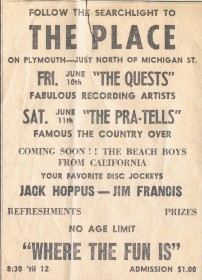
Shortly thereafter, the teen nightclub scene seemed to explode all around the state. As a result, The Quests played almost every Friday and Saturday night from then on. “We played on most every college campus from Ann Arbor to Kalamazoo, and we played countless high schools and teen dance clubs throughout lower Western Michigan," Fritzen said. "We transported our gear in a car with a small trailer, and we played primarily within a 60-mile radius from Grand Rapids. There were so many places to perform that we seldom had an open date during our several years together."
"There really was never a need for a manager in that we were consistently booked during the times we were available to play," Fritzen recalled. "Obviously, these were somewhat limited in that we were all in college at the time and the weekends were our primary playing dates. Various band members through the years took charge of the booking process.”
The Beatles had a big effect on The Quests, and the band covered many of their songs at their shows. Fritzen had also begun writing some original songs, and he composed “Scream Loud” after watching the reaction of the girls screaming while The Beatles performed on The Ed Sullivan Show.
The band made its first recordings at a local radio station in 1965 with DJ Bob Becker. These included the Fritzen originals “Secret Love” and “Look Up To Me”, along with the first version of “Scream Loud”. 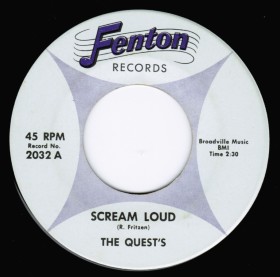 "Scream Loud" 45They next took these recordings to local radio station DJs. “Scream Loud”, received the greatest interest, although it was suggested that the guitar instrumental needed tweaking. The band then set up a recording session with Dave Kalmbach at his Great Lakes Recording Studio, located in a movie theater in Sparta, Michigan. The Quests had heard about Kalmbach’s studio from other area bands that had recorded there, and they hoped that he could help them polish both their vocals and instrumental tracks.
"Scream Loud" 45They next took these recordings to local radio station DJs. “Scream Loud”, received the greatest interest, although it was suggested that the guitar instrumental needed tweaking. The band then set up a recording session with Dave Kalmbach at his Great Lakes Recording Studio, located in a movie theater in Sparta, Michigan. The Quests had heard about Kalmbach’s studio from other area bands that had recorded there, and they hoped that he could help them polish both their vocals and instrumental tracks.
Shortly before the session, a major development in the band took place when Lyle Hotchkiss, a recent Junior College enrollee, was asked if he was interested in joining the band. He immediately auditioned with The Quests at a mixer in the GRJC commons, where his much stronger guitar sound earned him the offer to become the band's new lead guitarist.
Hotchkiss had played in the surf groups The Royaltones and The Stingrays while attending Belding High School. The Stingrays performed at the Inonia Free Fair, and they won a Lowell talent contest that led to them performing at the Lowell Showboat. He was a key addition only one week before The Quests were scheduled to record in Sparta.
Working with Kalmbach, they recorded a new version of "Scream Loud" along with an instrumental for the flipside called "Psychic" that Hotchkiss had written while he was in The Stingrays. The 45 was subsequently released on Kalmbach's Fenton label. The band took their “Scream Loud” single to WLAV, the # 1 Grand Rapids radio station at the time, and played it for DJs Jack Hoppus and Dick McKay who loved it. Jim Francis at WGRD also got behind the single which eventually peaked at # 2 on regional radio charts in Southwest Michigan. Listen to "Scream Loud" https://www.youtube.com/watch?v=YDgy_Gvbx_8
“Downtown record stores started selling it in display cases with the band’s photo. It was very exciting,” Fritzen remembered. “The gigs exploded! We were in demand, the crowds were larger, there were screaming girls, and we were making more money. It was a monumental change after the song became a hit in 1966,” he said. 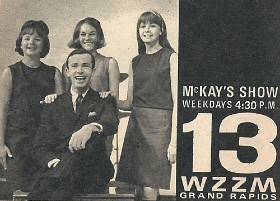 Dick McCay WZZM-AM
Dick McCay WZZM-AM
The success of "Scream Loud" led to appearances on several local radio programs and on live television, the most notable being McKay's Show, a weekday afternoon teen dance party patterned after American Bandstand and hosted by Dick McKay on Channel 13 WZZM TV in Grand Rapids.
According to Fritzen, a major label inquired about “Scream Loud” but they insisted the band tour behind it at a meeting held in Jim Nixon’s home. “The band didn’t want to tour and we turned them down,” Fritzen recalled. “I was determined to be a psychologist and Lyle wanted to be a dentist – everyone was into their college education. Also, there was the draft and the possibility of going to Vietnam that might happen if we were to lose our college deferments.”
Shortly after the meeting, Jim Nixon was fired from The Quests. He had some hard feelings over his sacking, and he took the band's master tape of “Scream Loud” with him when he left. His departure was followed shortly thereafter by Joey Suchocki, who enlisted in the Army. 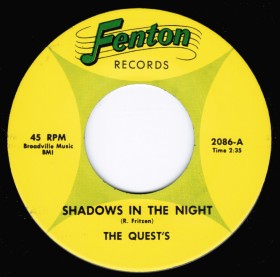
They band carried on as a four-piece, and it was the lineup of Fritzen, Hotchkiss, Dengate and Turmell that recorded The Quests’ finest single. Once again working with Dave Kalmbach at his studio in Sparta, the session produced two dynamite songs, “Shadows In The Night”, written by Fritzen, and “I’m Tempted”, penned by Hotchkiss.
Lyle Hotchkiss went into detail on the recording session in a recent email to MRRL: "Shadows in the Night begins with a rock ‘n roll drum intro before the lead guitar kicks in, emerging into an up-tempo stormer. The vocals are excellent with Fritzen’s frequent movers from a lower register to falsetto really enhancing the song. There’s also a sparkling guitar break which ends with a pleasing, more reflective bridge, then back to an ending where Fritzen hits some impressively high notes with apparent ease. The Quests’ Shadows In The Night is stacked with some mean guitar, but it’s also dynamically complemented with soaring Brian Wilson-inspired vocals."
"The vinyl recording that has become a garage band classic actually fell short of The Quests’ recording expectations," Hotchkiss wrote. "The band members were college students on tight budgets who could only afford a couple hours of recording time. It only took two takes to record I’m Tempted, but the complexity of over-dubbing vocals and guitar on Shadows In The Night was exceeding the band’s patience. Version after version were recorded live, with something amiss each time. This was especially trying for Fritzen, whose high vocals were approaching total collapse. Although the final rendition still had imperfections, the session ended with Fritzen’s exclamation, “I have nothing left. That’s it.”
Kalmbach had been excited by the success of “Scream Loud”, and he was sure that their new single would be a big smash as well. “Shadows In The Night” appeared to possess the potential to exceed the popularity of The Quests’ debut but a controversy prevented it from happening. Listen to "Shadows In The Night" https://www.youtube.com/watch?v=piP9Atfh6Hs
"It was an immediate hit on the local charts and we were very sure that "Shadows In The Night" was going to number one," Fritzen recalled. "As more records were sold, however, some parents became very concerned with the lyrics of the B-side, 'I'm Tempted'. The Grand Rapids radio stations contacted us with news that they were receiving numerous calls about the alleged sexual content in the lyrics," he said. "Within a month, the 45 was banned from further radio play and 'Shadows In The Night' was taken off the air in Grand Rapids," he said. "It was very disappointing." 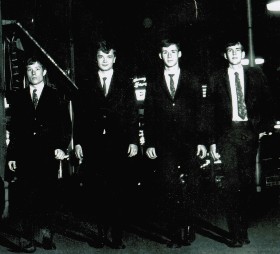 The Quests (L to R) B. Dengate, B. Fritzen, N. Turmell, L. Hotchkiss
The Quests (L to R) B. Dengate, B. Fritzen, N. Turmell, L. Hotchkiss
WLAV pulled it first and then the mothers called other local stations as well. Although no group took credit for the campaign, the fact that there were so many calls to area radio stations indicate that it was a highly organized effort.
Grand Rapids had a young, thriving rock and roll scene in the 1960s and it was probably threatening to an adult population that was known for being very conservative. The first Dutch settlers had arrived in Southwest Michigan in the middle of the 19th century, and they brought with them the strict doctrines of the Christian Reformed Church which frowned on playing musical instruments and dancing. That type of thinking persisted into the rock and roll era and may have had something to do with the phone campaign. Listen to "I'm Tempted" https://www.youtube.com/watch?v=5DO9RLivt6I
Looking back more than five decades, Bob Fritzen had this to say: “The young rock scene grew out of the sexual revolution of the 60s and the demonstrations against the war, which led to more freedom about saying what you thought. Music lent itself to that with the songs of the Stones, Beatles, and Dylan; and that built up an underlying pressure that would eventually come out through the teenagers,” he stated. “The garage band period grew because the bands were playing the music that spoke to the kids and they looked the part as well. It gave the kids a chance to rebel against the authority figures in Grand Rapids.”
Following the banning of “Shadows In The Night” in 1967, The Quests recorded their third single with Kalmbach at his studio. The A-side was a pleasing ballad, written by Fritzen and arranged by Hotchkiss, called "What Can I Do" that prominently featured Hotchkiss on guitar and keyboard. Because "Shadows In The Night" had been pulled from the radio before it could fulfill its promise, the band decided to put it on the flipside with the hope that it might have the potential to reignite on the charts. 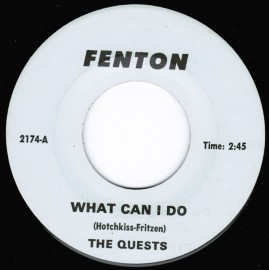
"As soon as "What Can I Do" was released it took off running, and in just a few weeks it climbed to # 24. Sales of the single went so well that we quickly ran out of records to place in the stores," Fritzen recalled. "Right when we were considering how many 45s to reorder, we received a call from Dick McKay, WLAV's top DJ and station manager, who told us that a Detroit record producer passing through Grand Rapids heard the song on the radio and called the station to get information. The producer told McKay to tell us that he'd be interested in promoting the record on a large scale, but only if we immediately pulled it from the Grand Rapids airways," Fritzen said. "So, we decided not to reorder more records. The song quickly dropped off the charts, and, sadly, we never heard from him again."
Seeking a fuller sound, the band next enlisted the talents of Ron Sieracki on keyboards. Sieracki, who also provided backing vocals, had played previously in several bands in the Grand Rapids area, including The Screaming Babies.
According to Fritzen, the Quests only entered two significant battles of the bands, one being the Western Michigan Battle of the Bands, which they won while playing at the 44th St. Armory in Grand Rapids. In the other battle, which was held in the Grand Rapids Civic Auditorium, The Quests finished second to The Jades, a six-piece teen band from Sparta that boasted two drummers and had also recorded singles with Dave Kalmbach. 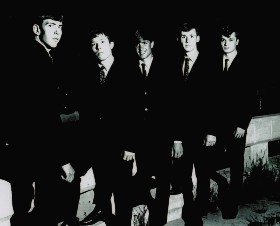 Final Quests lineup: Lyle Hotchkiss, Bob Dengate, Ron Sieracki, Neil Turmell, Bob Fritzen
Final Quests lineup: Lyle Hotchkiss, Bob Dengate, Ron Sieracki, Neil Turmell, Bob Fritzen
Despite the bad luck with their previous two releases, The Quests began work on a fourth single in 1968. Lyle Hotchkiss suggested recording at Midwestern Sound Studios run by Phil Roberts of The Kingtones, a popular Grand Rapids band that had released several regional hit singles in the early 1960s. By this time, Neil Turmell had left the band to enter the armed service, and he was replaced on drums by Steve Mazurek, an exceptional drummer who was only 18 years old.
The Quests recorded two songs with Roberts, including a ballad titled "Love Can Do These Things" that was similar to "What Can I Do" but not nearly as strong. The kicker in the session was a somewhat psychedelic tune called "That's My Dream" that had hit single written all over it. If "That's My Dream" would have been matched with their excellent cover of The Zombies' "She's Not There", previously recorded with Dave Kalmbach, the resulting 45 would have had a two-sided punch equal to the "Shadows In The Night/I'm Tempted" pairing. The songs on this "lost single" were never heard until recently, however, due to the band's break up in 1968 before a fourth 45 could be pressed. Listen to "That's My Dream". https://www.youtube.com/watch?v=QkIfL0grHOU
Personal issues helped end The Quests, but it probably had more to do with the fact that they were now going to different schools, making it difficult to keep the band going. The teen club era was also drawing to a close, and more radio stations were adopting the National Top 40 format which restricted DJs from creating their own playlists and all but eliminated the airing of local recordings. Rather than playing small concerts and dances, performing in bars would have been the logical progression for The Quests.
Actually, that was what Bob Fritzen and Ron Sieracki did after the band broke up. They had both graduated from Aquinas College in Grand Rapids, and they formed a band with Sieracki’s brother, Roger, on drums called Sound Investment. They played a wide variety, including standards, rock, country, blues, and pop. It was fun, and the money he made helped Fritzen pay for his doctoral program at Western Michigan University. They didn’t play any of The Quests’ songs, however, as they were a little too difficult to do with just three musicians.
Lyle Hotchkiss did much the same thing. He went on to play with an Ann Arbor band called Labyrinth to help pay the bills while he was attending dental school, and in the 1990s he and Sieracki teamed up once again, forming the bands Back Track, and then Wyze Gyze. 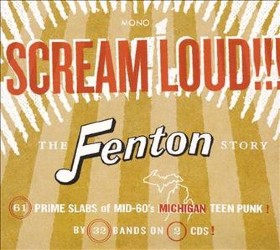
By the dawn of the 21st century, The Quests had pretty much faded into the mists of time except for songs that had appeared on any number of garage band compilations over the years. That all changed in 2007 with the release of “Scream Loud!!! The Fenton Story”, a 2 CD compilation of 61 songs that had been recorded by Dave Kalmbach and released in the 1960s by bands primarily from West Michigan.
Besides providing the title song for the compilation, CD 1 kicks off with The Quests’ controversial, and still scorching, “I’m Tempted”. The set also includes their classic “Shadows In The Night” single and the instrumental “Psychic”. It’s an outstanding collection, and it would be difficult to imagine that there could be a better document of the garage rock bands that recorded with Kalmbach.
2007 also saw The Quests come back together to work on a reunion CD titled “ReQuested: Back To The Garage”. The album contains nine songs that The Quests recorded back in the 1960s, seven with Dave Kalmbach and two with Phil Roberts, along with five new songs put together by Bob Fritzen and Lyle Hotchkiss. Released by the CDBABY label, the five new recordings were done at the River City Studios in Grand Rapids and featured original members Fritzen, Hotchkiss, Bob Dengate, Ron Sieracki, Neil Turmell, and new drummer Derrick Pearson. 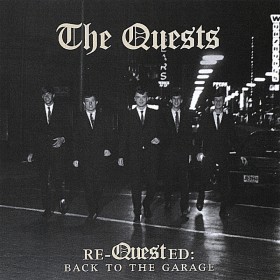 "ReQuested: Back To The Garage" CD (L to R) Sieracki, Dengate, Fritzen, Hotchkiss, and Turmell
"ReQuested: Back To The Garage" CD (L to R) Sieracki, Dengate, Fritzen, Hotchkiss, and Turmell
Speaking for The Quests, Fritzen said this to the interviewer from 60s Garage Bands: "Those years are remembered as among the most interesting and exciting of all our lives. In addition to having an opportunity to be involved with something extremely unique, we all primarily remember the tremendous friendships that were developed and have been maintained as brothers in the band. It has also been a great feeling for me to work both creatively and musically with each of them. The fact that we are now having a second chance to experience these feelings again is only more gratifying."
In 2020, The Quests were inducted into the Michigan Rock and Roll Legends Hall of Fame. The band's classic recording of "Shadows In The Night" was voted a Legendary Michigan Song that same year.
MRRL Hall of Fame: https://www.michiganrockandrolllegends.com/mrrl-hall-of-fame
